So-called independent voters, or those who do not identify as Republicans or Democrats, made up more than two-fifths of the electorate as the new year began.
Eight years into the 21st century, these voters began determining the outcome of presidential elections. Independents helped elect Barack Obama in 2008, preferring him by 8 percentage points. In 2016, they changed course and backed Donald Trump by a 4-point margin. Then last fall, they broke for Joe Biden and Kamala Harris by 13 points — delivering the margins of victory necessary for that ticket to secure the decisive electoral votes of Pennsylvania, Wisconsin, Georgia and Arizona.
And in last month’s twin Senate runoffs in Georgia, independents broke for the winners, Raphael Warnock and Join Ossoff, by 4 points, fueling the narrow victories that have delivered control of the Senate to the Democratic Party.
So it is becoming increasingly clear that independents are key in determining winners and losers at the ballot box.
The rise of the independent voter — with no formal name, no party affiliation and no common ideological doctrine — is increasingly becoming a volatile force in American politics. They now have the power to disrupt the status quo and drive structural reform. Half of millennials, 37% of Latinos, and 27% of African Americans identify as independents.
The Biden administration would be wise to reach out to this growing and diverse electorate and try to understand what motivates these voters. The assumption that they have wholeheartedly converted to the Democratic Party would be a major mistake.
Growing dissatisfaction with the two-party system and a frustration with government and the partisan entities that control it has fueled the growth of the independent voting bloc — yet these people are often given second-class status and are subject to subtle and not-so-subtle voter suppression.
Currently, independents are barred or restricted from primary voting in half the states, And a sizable number of independents are locked out of presidential primaries and caucus voting. They’re still widely dismissed as a sideshow to the nation’s serious political action, rather than seen as a diverse force that is making a statement of noncompliance with the system driven by the two parties.
There are several steps that the Biden administration can undertake to address these unaffiliated voters.
First, it should reach out and listen to the concerns of the independent voter. A recent survey found 81 percent of them view the coronavirus crisis as having “made the problem of partisanship in our government clearer and more critical to address.”
Second, the new president should bring independents into his administration, appointing them to key policymaking positions. It is one thing to look to create unity between Democrat and Republican policymakers. It is another to form a government that is accurately representative of the state of the electorate by signaling that the White House is attuned to the public disgust with partisanship. Period.
Third, the president should use his leverage over his party to press the Democrats Party to open future presidential primaries and caucuses to independents. The Supreme Court has recognized the right of political parties to determine who is eligible to vote in these nominating contests, whether or not state law agrees. And there is a need to better understand how voter registration laws compel partisanship: Members of the parties enforce discipline by threatening primary challenges against any of their elected officials who break with a party dictate.
Lastly, the administration should look into restructuring the Federal Election Commission to make it a nonpartisan rather than bipartisan regulator of campaign finance law.
Public faith in the electoral process has been rocked by recent events. To restore and expand that faith across the political spectrum, there must be demonstrable changes that lift voting and governing above and outside partisan control.
The continuing flight of millions of voters from the Republican and Democratic parties is reshaping the nation’s political landscape in ways no one can control or even predict. It threatens the very basis upon which we have long analyzed campaigns and elections. Identifying and wooing the independent voter should rank among the most urgent challenges facing candidates, campaigns and political professionals.
More importantly, the country is trying — in jagged and conflictual ways — to define our future and our priorities. Independent voters have an important role to play in shaping that future without having to bend to the practices and partisan divides of the past.
Thom Reilly is a professor of public affairs at Arizona State University. He was chancellor of the Nevada System of Higher Education from 2017 to last year.



